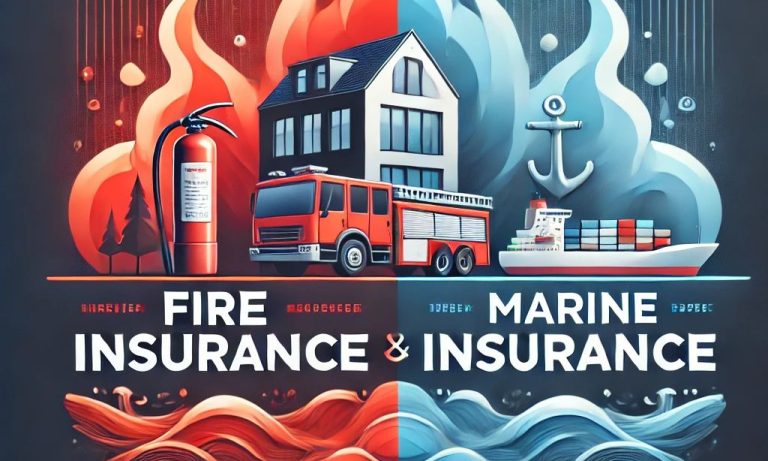Fire insurance and marine insurance are two essential types of insurance that help protect valuable assets. It includes losses and damages of fires to property, buildings, and their contents. Marine insurance is for ships, cargo, and freights while in transit by water. Both are protections offered to businesses and persons alike against unforeseen incidents in which financial loss, due to an accident or catastrophe, would be kept as minimal as possible. In this article, we will study the details of fire insurance and marine insurance, the differences between them, and what they offer.
What is Fire Insurance?
Fire insurance is a type of property insurance that covers damages caused by fire. It protects the property and its contents from losses due to fire, which can be devastating for homeowners, businesses, and other property owners. Fire insurance may also cover damages caused by lightning strikes, explosions, and other risks associated with fire-related incidents.
Key Components of Fire Insurance
- Property Coverage: Fire insurance generally covers physical property like buildings, structures, and the contents within. This includes furniture, electronics, inventory, and other valuable items.
- Business Interruption: Some fire insurance policies include coverage for loss of income due to a fire that disrupts business operations. This coverage ensures that businesses can recover financially while repairs are made.
- Additional Risks: Many fire insurance policies also cover risks such as damage from lightning strikes, explosions, and even vandalism that occurs during or after a fire.
Benefits of Fire Insurance
- Financial Protection: It helps cover the cost of rebuilding or repairing property after a fire.
- Business Continuity: For businesses, it ensures operations can continue with minimal loss during repairs.
- Peace of Mind: Property owners feel secure knowing they are protected against one of the most destructive risks.
What is Marine Insurance?
Marine insurance is a type of insurance that covers ships, cargo, and freight while they are in transit over water. It protects businesses involved in shipping and trade by covering damages or losses that occur during transportation. Marine insurance is crucial for anyone who ships goods, whether for international trade or local transport, as it provides financial security against risks such as accidents, piracy, and natural disasters.
Types of Marine Insurance
- Hull Insurance: This covers damage to the ship or vessel itself, including accidents or collisions at sea.
- Cargo Insurance: It covers goods being transported by sea. This insurance ensures that the value of the cargo is compensated if it is lost or damaged during the voyage.
- Freight Insurance: This protects the freight value, which is the income a shipping company earns from transporting goods.
- Liability Insurance: Marine liability insurance covers damages that a ship causes to other ships, property, or even the environment.
- War Risk Insurance: This type of marine insurance covers the risk of damages caused by war, terrorism, or piracy.
Benefits of Marine Insurance
- Risk Mitigation: It helps businesses minimize the financial impact of shipping-related risks.
- Global Coverage: Marine insurance often covers international trade, offering protection across borders.
- Customizable Policies: Policies can be tailored to suit the specific needs of the business or shipment.
Difference Between Fire Insurance & Marine Insurance
Although fire insurance and marine insurance both offer protection against risks, they cover different types of assets and events. Below are the key differences between fire insurance and marine insurance:
Purpose of Coverage
- Fire Insurance: The primary purpose of fire insurance is to cover damages caused by fire to property, buildings, and their contents. It is focused on protecting property from fire-related risks.
- Marine Insurance: Marine insurance, on the other hand, is designed to protect ships, cargo, and freight during transportation over water, covering a variety of risks such as accidents, piracy, and natural disasters.
Type of Risk Covered
- Fire Insurance: Fire insurance covers risks specifically related to fire, such as fire damage to property, as well as damage from lightning strikes or explosions. It may also include vandalism during or after a fire.
- Marine Insurance: Marine insurance covers risks that occur while goods are being transported over water, including ship damage, cargo theft, piracy, and damages from natural disasters like storms or hurricanes.
Beneficiaries
- Fire Insurance: The beneficiaries of fire insurance are typically property owners or business owners whose properties are damaged by fire.
- Marine Insurance: The beneficiaries of marine insurance are shipping companies, businesses, and cargo owners who stand to lose financially if a shipment or vessel is damaged during transit.
Duration of Coverage
- Fire Insurance: Fire insurance coverage is typically an annual policy that needs to be renewed. It is designed to protect property against fire damage over the course of the year.
- Marine Insurance: Marine insurance coverage is usually specific to the duration of the voyage or shipment. Once the cargo reaches its destination, the coverage ends.
Premium Structure
- Fire Insurance: Fire insurance premiums are typically calculated based on the value of the property, the level of coverage, and the risk of fire in the area where the property is located.
- Marine Insurance: Marine insurance premiums are determined by the value of the cargo, the type of vessel, the shipping route, and the specific risks associated with the transit, including the potential for piracy or natural disasters.
Conclusion
Both fire insurance and marine insurance are essential forms of coverage, but they serve different purposes. Fire insurance protects properties from fire-related damages, offering peace of mind to homeowners and businesses. Marine insurance, on the other hand, safeguards assets involved in maritime trade, covering vessels, cargo, and freight during transit. Understanding the key differences between these two types of insurance can help businesses and individuals make informed decisions based on their unique needs. Whether you’re protecting your home or your goods in transit, both forms of insurance are valuable tools for managing risk.
Fire Insurance vs Marine Insurance FAQs
What is the difference between fire insurance and marine insurance?
Fire insurance covers property damage caused by fire, while marine insurance covers damage to ships and cargo during maritime transport.
What does fire insurance cover?
Fire insurance covers damage to property from fire, lightning, and explosions. It may also include coverage for vandalism during or after a fire.
What is covered under marine insurance?
Marine insurance covers ships, cargo, and freight, protecting against risks like accidents, theft, piracy, and natural disasters during transit.
How are premiums for fire and marine insurance calculated?
Fire insurance premiums are based on property value and fire risk, while marine insurance premiums depend on cargo value, vessel type, and shipping route risks.
Can I have both fire insurance and marine insurance?
Yes, you can have both fire insurance to protect your property and marine insurance to protect your assets during maritime transport.


